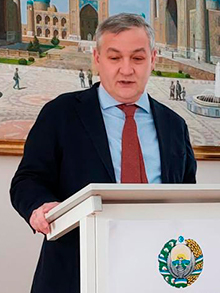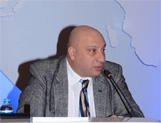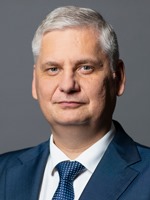Strategic Abstention: The ‘Axis of Resistance’ Deliberate Inaction in Gaza[Over]
 By Fuad SHAHBAZOV, Baku-based independent regional security and defence analyst By Fuad SHAHBAZOV, Baku-based independent regional security and defence analyst
Amid the escalating Gaza war, a striking absence marks the regional conflict landscape: the non-involvement of the ‘Axis of Resistance,’ including Iran and its proxies. Nearly six weeks into the war, these forces have consistently communicated their decision to remain on the sidelines. This inaction comes into sharp focus against the backdrop of Iran’s strategy to leverage non-state actors like Hezbollah and Hamas in its proxy warfare. While Hezbollah’s leader, Hassan Nasrallah, clarified their stance in a much-anticipated speech a month into the conflict, the impact of this abstention is profound. Israel, grappling with internal divisions and security vulnerabilities heightened by Hamas’s attacks, finds itself in a precarious position not seen in decades.
READ MORE
- Tuesday, 5 December 2023, 13:02
The main directions of the state policy of Uzbekistan in the context of improving the country's position in international rankings and indices[Over]  Tokhir Khasanov, Academy of Public Administration under the President of the Republic of Uzbekistan, DSc. in Economics, Associate Professor Tokhir Khasanov, Academy of Public Administration under the President of the Republic of Uzbekistan, DSc. in Economics, Associate Professor
Uzbekistan, nestled in the heart of Central Asia, has historically been a melting pot of cultures and civilizations, thanks to its pivotal role in the Silk Road. Its rich tapestry of history reflects a blend of empires, nomads, and diverse cultures that have left their mark over millennia.
READ MORE
- Tuesday, 28 November 2023, 07:45
Uzbekistan’s April 30 Constitutional Referendum Is Set To Deliver Results[Over]  By Ambassador Dilyor KHAKIMOV, Ambassador of the Republic of Uzbekistan in Belgium By Ambassador Dilyor KHAKIMOV, Ambassador of the Republic of Uzbekistan in Belgium
Over the past year, under the leadership of President Shavkat Mirziyoyev, Uzbekistan has embarked upon a national dialogue. Input, feedback, and affirmations from tens of thousands of Uzbek citizens have guided the drafting of a revised Constitution. In recent days, a flurry of activity has occurred that may soon make this draft official and usher in a fresh era for our country as we build a “New Uzbekistan.” Last week, the draft Constitution was considered in the Legislative Chamber and was approved for submission to a referendum on April 30. Then, on Monday, March 13, the Constitutional Court of Uzbekistan ruled that the decision by the Legislative Chamber to hold a referendum was in constitutional compliance. Finally, the Senate, just yesterday, March 14, confirmed this decision and approved the draft for submission to a constitutional referendum that will take place on April 30. READ MORE.
- Wednesday, 15 March 2023, 14:32
Putin and the 2022 Russian Military Conflict in Post-Soviet Lands[Over]  By Alan WHITEHORN, Professor Emeritus in Political Science, The Royal Military College of Canada By Alan WHITEHORN, Professor Emeritus in Political Science, The Royal Military College of Canada
Coming to power after the break-up of the Soviet Union in the 1990s, Lukashenko had ruled Belarus in a highly autocratic fashion for almost three decades, while seeking to navigate his country within Moscow’s sphere of influence. However, the aging leader’s arbitrary rule began to teeter and he faced a major challenge in the election of 2020. When skewed and rigged election results were announced, hundreds of thousands of voters of Belarus peacefully protested their strong objections.
The West echoed moral support to the mass of citizens voicing democratic demands on the streets, but provided little material assistance. Somewhat optimistically and naively, the West trusted that the unarmed people would peacefully prevail over the coercive might of the internal and external dictators in Minsk and Moscow. Putin, by contrast, sensing a vulnerable and weakened regime, provided his fellow authoritarian colleague with external assistance to forcefully crush the peaceful demonstrators. READ MORE
- Thursday, 17 March 2022, 07:54
Are We Seeing a New National Strategy on Human Rights Emerging in Uzbekistan under President Mirziyoyev?[Over]  Embassy of the Republic of Uzbekistan in the Kingdom of Belgium Embassy of the Republic of Uzbekistan in the Kingdom of Belgium
On June 22, 2020, the President of the Republic of Uzbekistan, Shavkat Mirziyoyev, signed a Decree on Approval of the National Strategy of the Republic of Uzbekistan on Human Rights. Much has been said about Uzbekistan’s efforts to reform and modernize multiple aspects of society and economy since Mirziyoyev became president in 2016. Human rights are a core area of national reform, in this respect. It should be noted from the outset that discussions around this subject in Uzbekistan during the early years of the country’s independence have not always focused on the most celebrated factors.
READ MORE
- Wednesday, 7 April 2021, 22:37
Political Crisis in Georgia after the Parliamentary Elections[Over]  By Nika Chitadze, PhD, Professor at the International University of the Black Sea, Tbilisi By Nika Chitadze, PhD, Professor at the International University of the Black Sea, Tbilisi
As it is well known from recent media reports, a new political crisis has emerged in Georgia after the October 31, 2020 parliamentary elections. The main reason for this crisis is the fact that the opposition parties have claimed that the Central Election Commission and the ruling party “Georgian Dream” have falsified the election results and have usurped the power. The National Democratic Institute and the American Republican Institute have expressed their critical views in this regard. A relatively soft position was stated by the OSCE Office for Democracy and Human Rights and the Council of Europe.
READ MORE
- Thursday, 7 January 2021, 06:15
Russia and Eurasian Dilemmas[Over]  By Sergey Markedonov, Leading Researcher, MGIMO Institute
By Sergey Markedonov, Leading Researcher, MGIMO Institute
Future historians will definitely christen the year 2020 as the worldwide onset of coronavirus. It seems like tons of research articles and expert reports on the impact of the pandemic on the global economy and international political processes have been published. However, it is quite obvious that with the focus having been shifted towards the global perspective, the processes taking place in individual countries and regions appear to be falling out of sight. In the meantime, all of the conclusions drawn about the comprehensive implications of COVID-19 will remain somewhat schematic and generic without due consideration of their nuances and peculiarities. READ MORE
- Thursday, 4 June 2020, 21:47
Non-alignment Policy as a Principle of Shaping the National Security of Azerbaijan[Over]  By professor Sadi Sadiyev Saleh, War College of the Armed Forces, Republic of Azerbaijan By professor Sadi Sadiyev Saleh, War College of the Armed Forces, Republic of Azerbaijan
The emergence of a bipolar world and the formation of two military blocks (NATO and the Warsaw Pact) after the Second World War ushered in an intense rivalry between different countries. Finding an effective grand strategy to survive between two hostile powers inevitably requires a balanced policy. In this context, the underdeveloped countries felt the need to join efforts for the common defence of their interests, to strengthen their independence and sovereignty and to express a strong commitment for peace by declaring themselves as “non-aligned” from either of the two nascent military blocks. READ MORE
- Thursday, 14 February 2019, 20:25
|
|